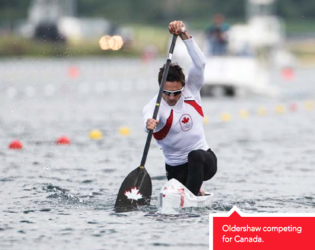
English Graduate, Olympic Medal winner
At the 2012 London Olympic Games, Mark Oldershaw captured a bronze medal for Canada by posting a time of 3:48 in the one-man 1,000-metre canoe sprint. The 2010 English graduate recently took some time out of his schedule to discuss the Olympics, family, his time at Carleton, and the universal importance of preparation and perseverance.
(This story was first published in the 2013 edition of FASSinate)
Congratulations on your bronze medal! I know this is no easy task, but could you do your best to describe what it was like to represent Canada in London, and to come back home as a national hero, with a bronze medal in pocket?
Thanks. It is indeed difficult to put into words how it felt to represent and win a medal for Canada at the Olympics. Since I was a little kid it had been a dream of mine to represent Canada at the Olympics, and growing up, most of my heroes were athletes that wore the maple leaf (the red one) on their chests. So, needless to say, not only wearing my Canadian singlet at the Games, but also getting to watch the Canadian flag rise during the medal ceremony, was a dream come true. Next on the list is getting to hear our National Anthem while doing it!
You hail from a long family line of celebrated athletes. What was your path to becoming an Olympic medalist like? What inspired you to keep working, even when the road got tough (surgeries, etc.), and what principles were instilled in you that allowed you to commit to a goal whose pursuit must be almost entirely consuming?
Growing up, like I said, I dreamed of going to the Olympics. As a young athlete I pursued that dream with passion, and things were going very well. I won the Junior World Championships, and then made the Senior team the very next year. However, my path from then on was not nearly as smooth. I had many injuries and setbacks that made me doubt if I would ever get to the Olympics at all. Throughout them all, however, there was a small part of me that knew what I was capable of doing. A fire if you will, that had been dimmed by obstacles and doubt, but never extinguished. I knew that I wouldn’t be able to live with myself if I gave up without giving it everything I had. Once I got through my injuries and setbacks I was able to put 100% into achieving my goals.
How did academics fit into your life? So many athletes put school on the sidelines to focus on their sport; you were able to be simultaneously successful in sport and academia. How?
Well, it was difficult, and, to be honest, it took me a while to figure it out. My first few semesters of university weren’t the greatest, as I didn’t take it seriously and really only thought about training. The funny thing is that during that time I didn’t have great results on the water either! It wasn’t until a bit later on that I realized that I could handle doing both school and my sport. Not only that, but I also realized that going to school actually helped my athletic career. Training for the Olympics can be very intense, and while endless hours of training go into it, if you don’t have balance in your life, it can overwhelm you. School gave me that balance, something to think about and focus on while I wasn’t on the water. That being said, I rarely took a full course load, and took a few semesters off when I needed to be away at training camp for too long. But, to be honest, I don’t see the rush of getting through University; every- one should go at their own pace if they can. Also, what made a huge difference for me was the realization that professors (most of them) aren’t the bad guys, and that if you talk to them and ask for help they are usually quite accommodating, which is important when you are away for a majority of the semester! Oh, and CUTV [Carleton courses which are broadcast on television]!
Did you take a similar approach to school as you would take to your athletic training?
School and sport are very similar, and, yes, I guess I approached them in the same way. They are both about preparation. Whether it’s an exam or a race, when you’re sitting for it waiting to start, you know whether or not you’re prepared for it. And what it takes to be truly ready is daily preparation. You can’t properly train for a race by trying to do it all the night before, just like you can’t properly study for an exam by trying to cram the night before. You might be able to get by, but you won’t be doing your best.
Can you describe your experience as an English major at Carleton? How has achieving an English degree from Carleton played a role in your life?
I had a great experience at Carleton. Ottawa is a great place to live, train and go to school. Pursuing an English degree gave me something to focus on other than my Olympic dream, gave me balance in my life and made sure I wasn’t just a dumb jock!
===